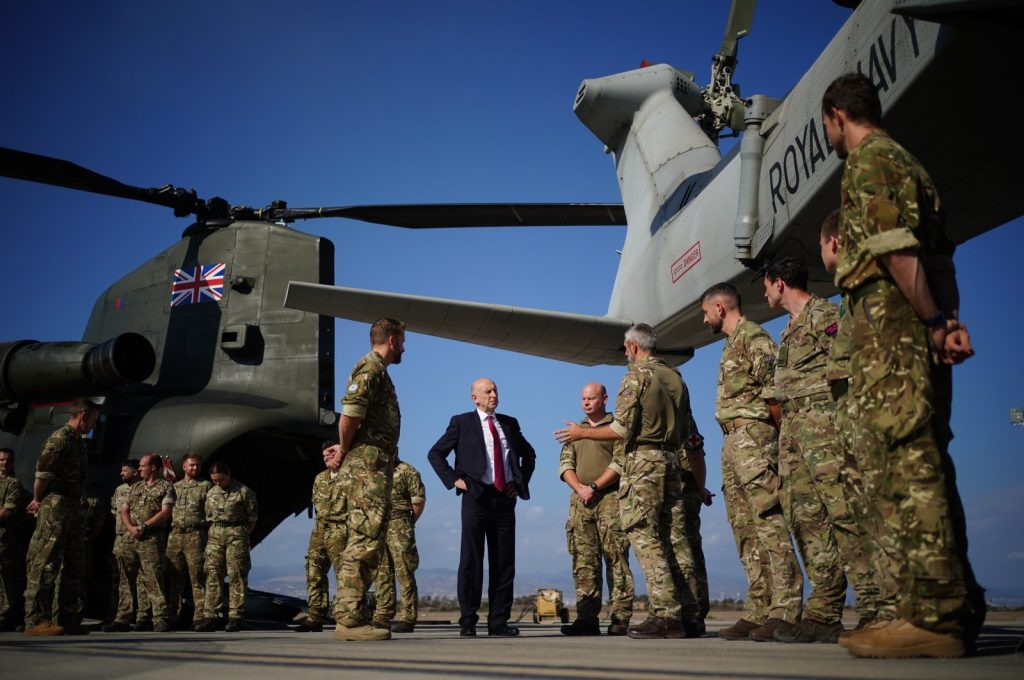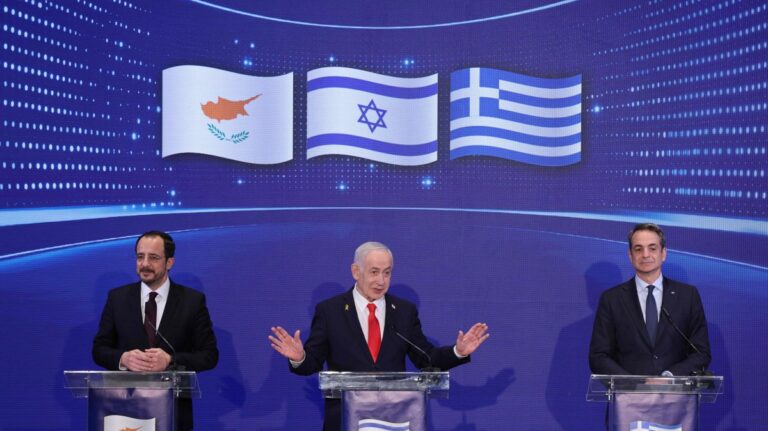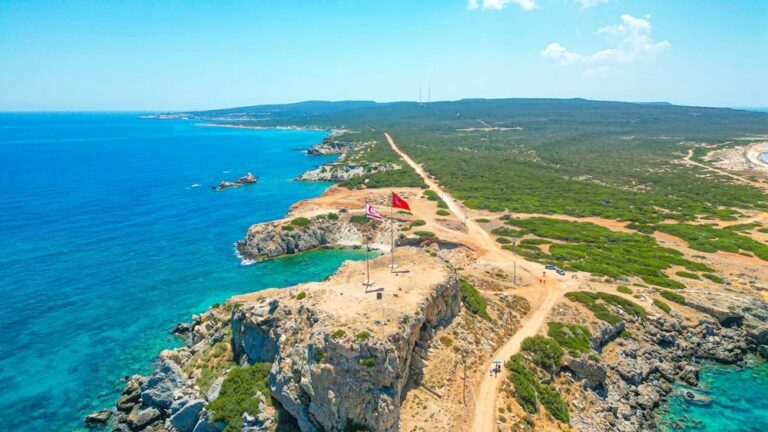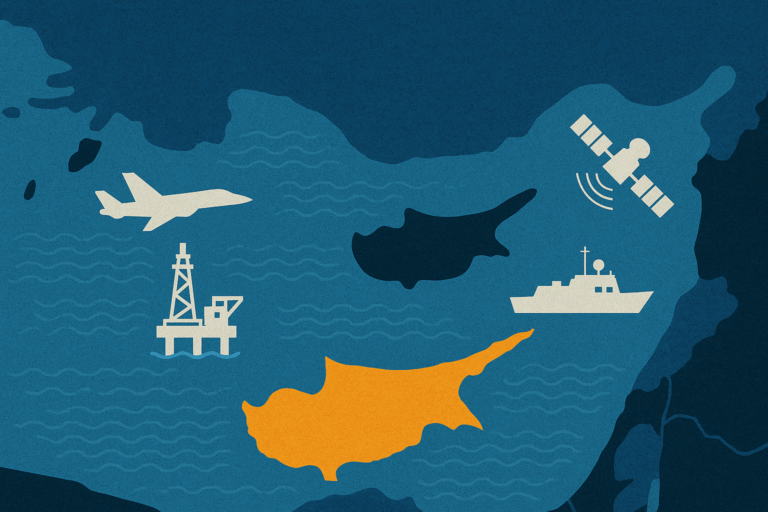Cyprus has often found itself the reluctant belle of the Eastern Mediterranean, a magnet for regional and global powers eager for diplomatic maneuvering – or, if that fails, a struggle for influence. As the island’s strategic allure intensifies, so does the parade of military alliances and geopolitical courtships, with Cyprus caught squarely at the crossroads of Europe, Asia and the Middle East. This strategic allure isn’t new; Cyprus has long been viewed as a sought-after outpost. The current militarization of this small Mediterranean island is not merely another move in the chess game of regional power; it’s a shift with serious implications for Mediterranean stability – or, potentially, its opposite.
Historically, Cyprus has been a prized outpost for powers eager to monitor the Middle East. The British, with their ever-expanding imperial footprint, claimed the island as a colonial possession in 1878, establishing it as a sentinel over nearby regions. Even after granting independence in 1960, Britain retained two sovereign bases, Akrotiri and Dhekelia, transforming them into intelligence hubs and military launchpads throughout the Cold War. While the Union Jack no longer flies over all of Cyprus, these bases remain Western footholds, facilitating surveillance across the Middle East. In essence, Cyprus was built for its current role in military escapades – even if the island might prefer a different, less fraught path.
However, the island has faced internal division since 1974, when a coup backed by Greece aimed at unifying it with Greece, leading to a subsequent Turkish military intervention. This intervention established a Turkish Cypriot-administered north and a Greek Cypriot-administered south – a division that endures today, monitored by the U.N.-patrolled “Green Line.” New alliances have only intensified this divide, as recent Western partnerships reinforce the Greek Cypriot orientation, often at the expense of relations with Türkiye. The result? Cyprus, a militarized outpost for Western powers, grows increasingly entrenched in opposition to Turkish influence.
Cyprus as a ‘must-have’ ally
With the Soviet Union’s collapse, Cyprus quickly became a hotter commodity for the West. Its prime real estate near volatile Middle Eastern hot spots made it an ideal partner for the U.S., France and Israel – all eager for a staging ground for surveillance and training exercises. Joint military exercises blossomed in the 2000s, symbolizing this newfound strategic camaraderie. The expansive 2019 military exercise among the Greek Cypriot administration, Greece and Israel underscored Cyprus’ rising value in Western military strategy. In 2020, the U.S. lifted a longstanding arms embargo on the south – a Cold War relict meant to limit militarization on the island and prevent an escalation between Greece and Türkiye. Initially allowing only non-lethal exports, the policy shifted to full military support in the subsequent years. In return, the southern Cyprus administration agreed to ban Russian vessels from ports, inching the island closer to NATO’s orbit.
In the grand geopolitical playbook, France’s recent moves in Cyprus read like a classic power pivot. Confronted with Türkiye’s expanding influence in Africa, France turned to Cyprus (and its former colony Lebanon) as a Mediterranean counterbalance. By 2017, France had signed a defense pact with the Greek Cypriot administration, granting its naval vessels access to Greek Cypriot ports like Limassol and laying the groundwork for air force collaboration. Joint exercises with southern Cypriot troops and Greece followed, bolstering France’s presence in the region and symbolizing a broader Western front – often at odds with Türkiye.
However, France’s interest in the Eastern Mediterranean isn’t purely political. French energy giant Total has extensive gas exploration ventures in the region, making southern Cyprus’s stability integral to France’s economic interests. Securing access and protection for these resources is a priority for France, linking its military presence directly to economic ambitions.
Additionally, France regards the Eastern Mediterranean as a region of strategic interest for the European Union. The country has actively lobbied in Brussels to shape EU policies toward Türkiye and other regional players, aiming to align EU strategy with its own regional objectives. Thus, the island has become more than a base; it’s a badge of allegiance to Western – and particularly French – interests.
For Greece, the Greek Cypriot administration is a natural ally and, arguably, an extension of its historical legacy. The trilateral pact among Athens, South Nicosia and Tel Aviv has effectively tied southern Cyprus to Greek foreign policy ambitions, much to Türkiye’s chagrin. As Türkiye asserts itself in the northern part of the island, Greece counters by backing South Cyprus’s alliances with France, the U.S. and Israel. The militarization of the island thus fits neatly into Greece’s broader strategy, establishing a new axis of influence that shapes the region’s security dynamics while positioning southern Cyprus as a barrier against Türkiye.
U.S. and Israel’s calculations
South Nicosia’s role as a military collaborator with Israel stems from both economic ambition and strategic necessity. Amid the ongoing genocide in Gaza and tensions in the region, Tel Aviv has considered using Cypriot bases for contingencies, further embedding Cyprus within the region’s military framework. Then there’s the gas. The discovery of gas reserves in the Eastern Mediterranean has drawn Israel and the southern Cyprus administration into a cooperative venture for the East Med Pipeline – a project promising Europe an energy supply route independent of Türkiye. But Ankara responded swiftly, culminating in a 2019 maritime agreement with Libya that stakes a Turkish claim to Mediterranean waters, effectively blocking the pipeline. For Cyprus, energy security has become a flashpoint for regional rivalry, deepening its military alliances and adding another layer of conflict with Türkiye.
With the U.S. lifting its arms embargo, the Greek Cypriot administration militarization gains a powerful Western sponsor eager to counter both Russian and Turkish influence. The Cypriot administration’s inclusion in programs like International Military Education and Training (IMET) underscores its role as a U.S. ally and regional linchpin. The island offers the U.S. and its allies prime access to Mediterranean resources and a front-line position in managing regional tensions, aligning it firmly with NATO’s agenda. Enhanced cooperation between the U.S. and British bases in Cyprus for operations in the Middle East has now intensified, with U.S. naval units deployed to support Israel and regional allies.
Germany, too, has entered the Cypriot stage with recent deployments, including special forces ostensibly preparing for evacuations amid Middle Eastern tensions. This follows the first Bilateral Defense Cooperation Program signed in May 2022. Also, while subtle in its approach, Italy has quietly integrated itself into Cyprus’ defense scene. The recent “Eunomia 5-2024” exercise underscored Italy’s interest in protecting its regional investments, notably in energy exploration. Italian energy giant Eni has a vested interest in Cyprus, aligning economic goals with a regional security strategy.
More than a Western garrison
As the Greek Cypriot administration leans into its military partnerships, it becomes the Western front line, either for stability or confrontation in the Eastern Mediterranean. The question is whether this militarized stance will ultimately serve the island’s best interests or merely deepen its divisions. While alliances may bolster security for some, they risk turning southern Cyprus into a military stronghold, potentially distancing it from regional neighbors, including Türkiye and the Turkish Cypriot north, both of whom have a vested interest in regional cooperation.
For a sustainable and balanced future, South Nicosia could benefit from a shift toward inclusive diplomacy that considers the perspectives of all key stakeholders. Recognizing Ankara’s strategic importance and fostering a balanced alliance could help to defuse regional tensions and promote mutual interests. This approach might also better serve the island’s future stability, aligning security goals with a shared vision for prosperity and cooperation that includes all parties in the Eastern Mediterranean.
By doing so, South Nicosia could seize this moment to step away from the clutches of distant powers and champion a balanced vision for peace and cooperation – a novel role for a region that has, for a long time, been more war-zone than bridge.




